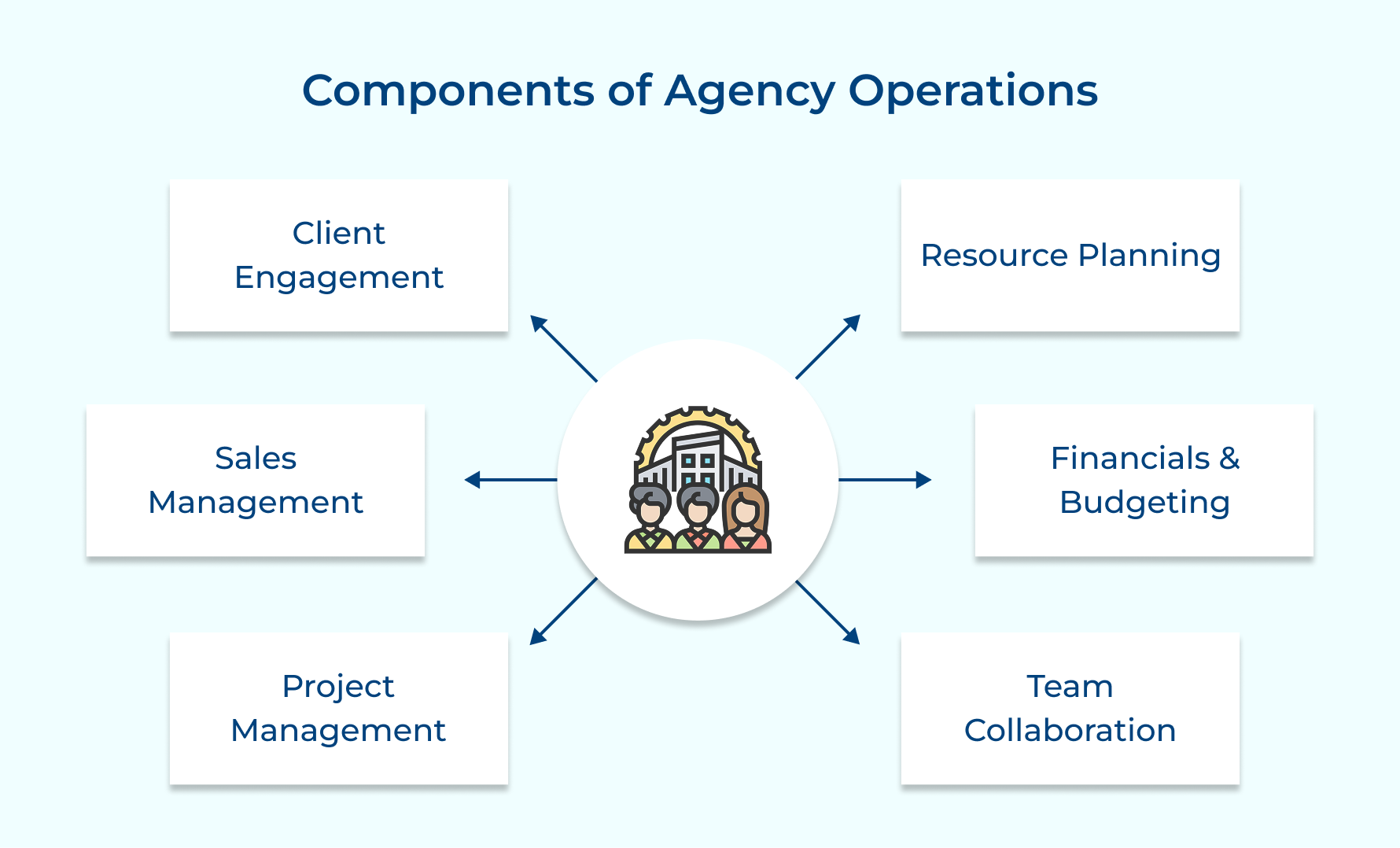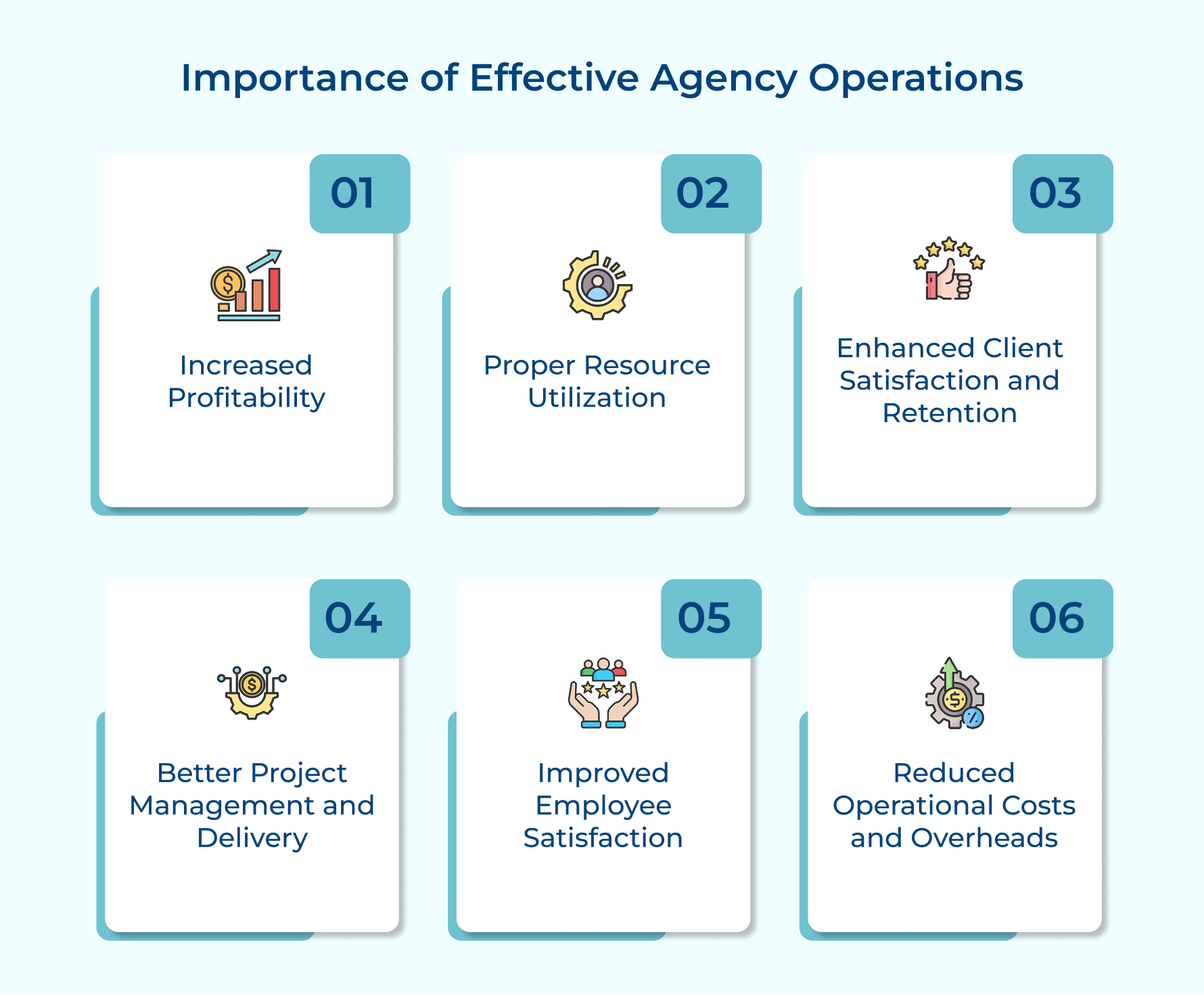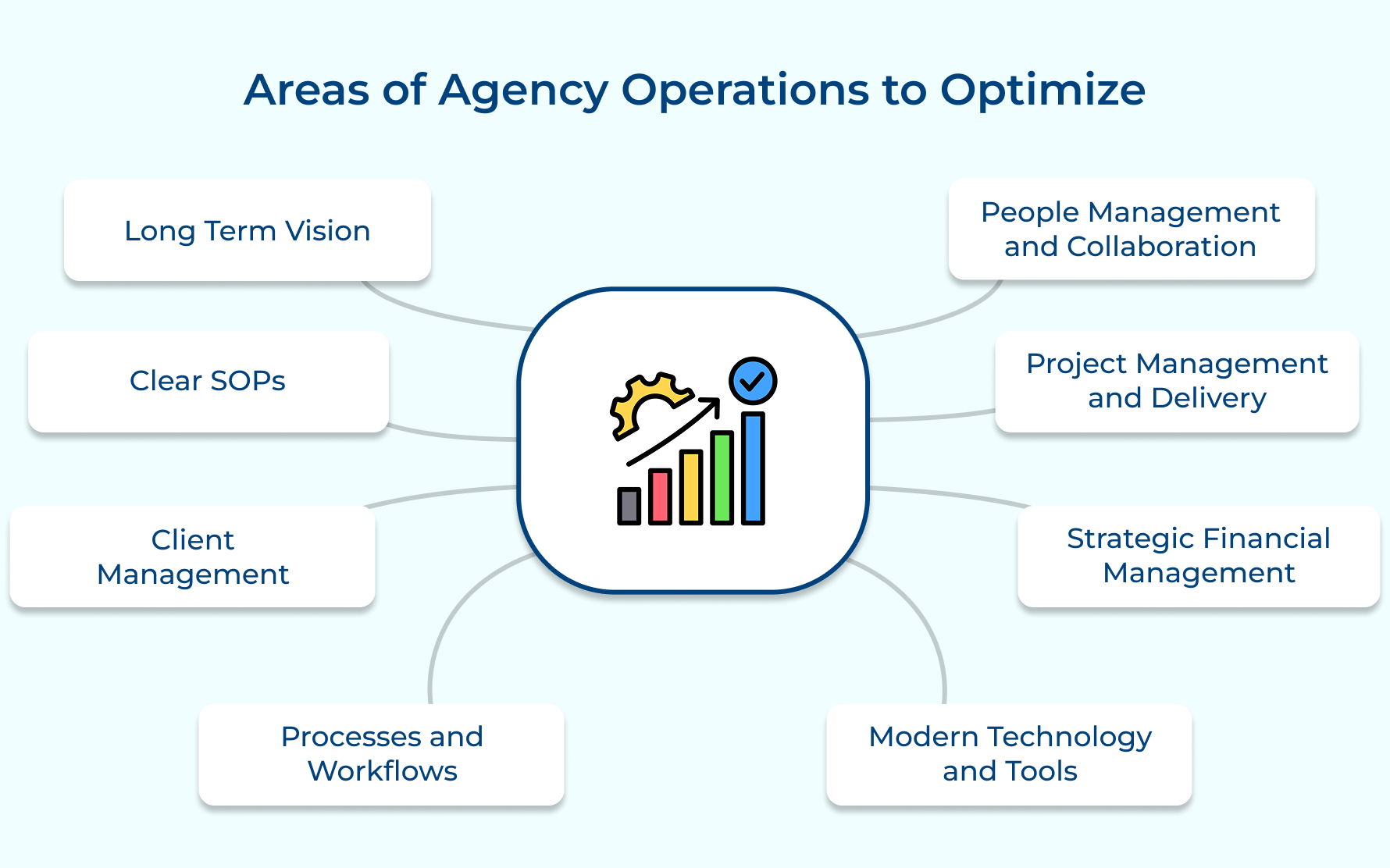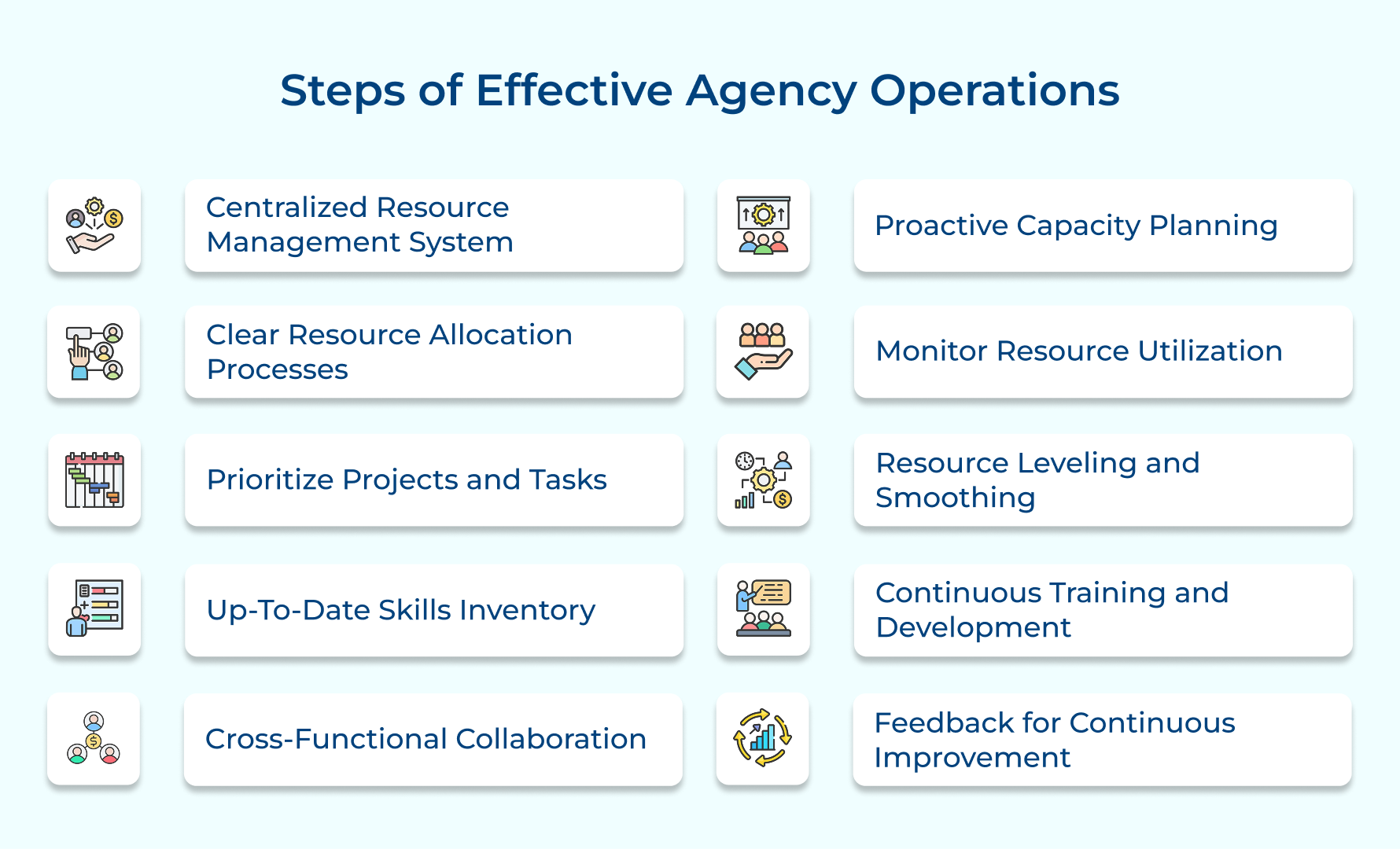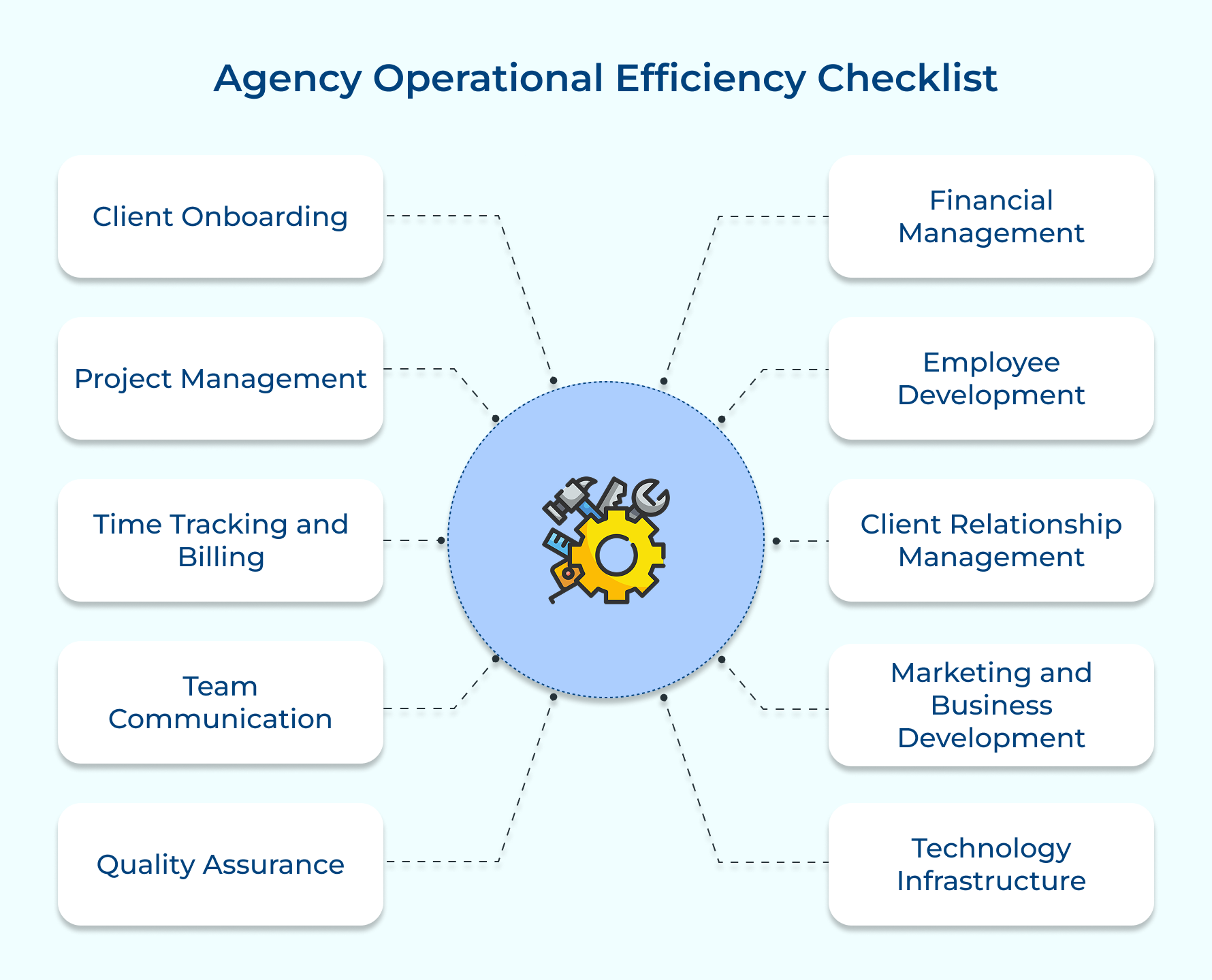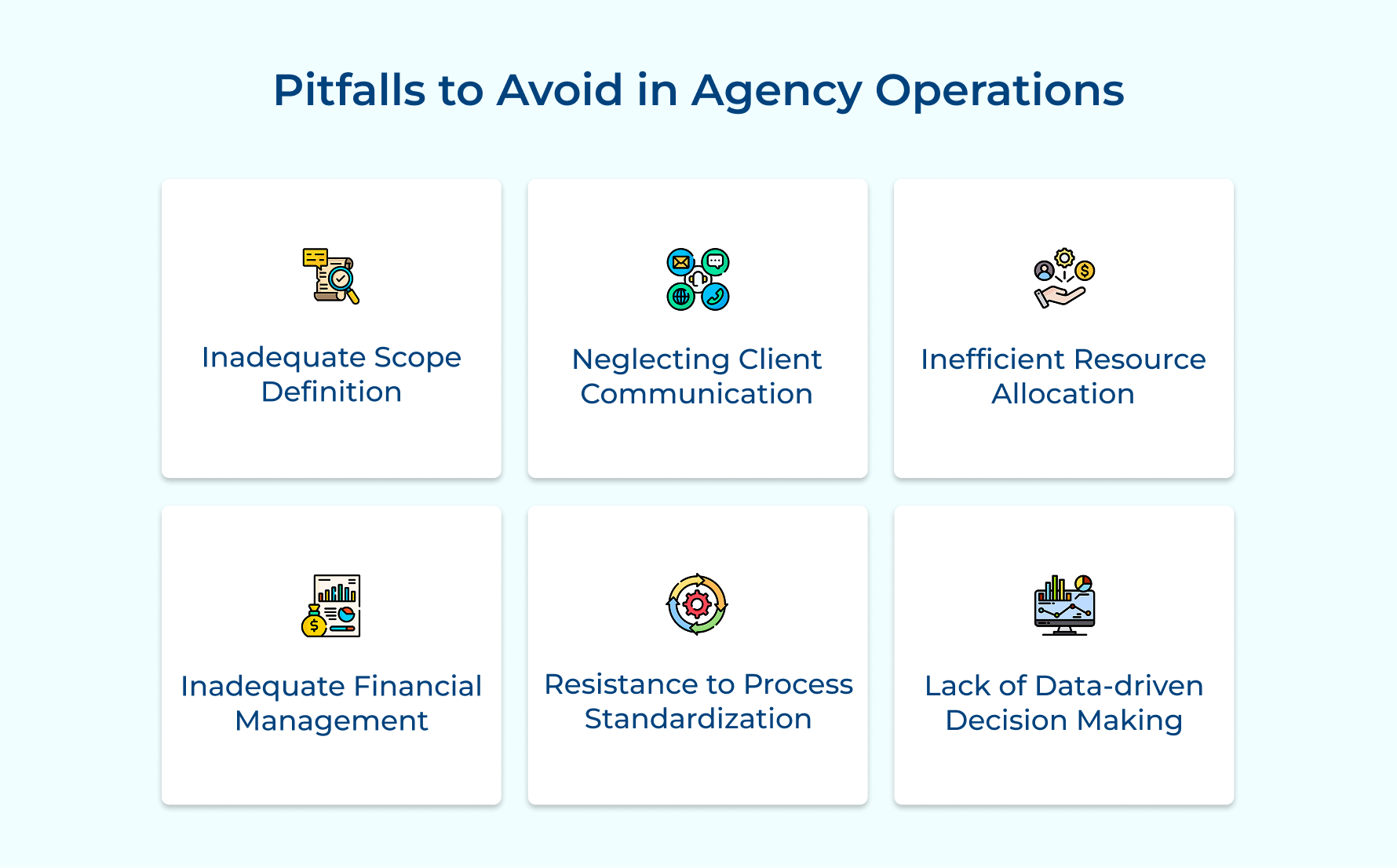10 Essential Steps to Ace Agency Operations
- What is Agency Operations?
- Key Components of Effective Agency Operations
- Importance of Effective Agency Operations
- Key Areas of Agency Operations To Optimize
- How to Ace Agency Operations: 10 Proven Steps
- Agency Operational Efficiency Checklist
- Common Pitfalls to Avoid in Agency Operations
- Optimize Agency Operation for Future Growth
- FAQs about Effective Agency Planning & Operations Management

Key Highlights:
- Strengthen client trust with clear communication and personalized, proactive service delivery.
- Maximize profitability through efficient resource planning and streamlined workflows.
- Agency operations help deliver consistent results via SOPs and effective project management methodologies.
Teams often deal with scattered workflows, inconsistent processes, and bottlenecks that drain resources, leading to missed deadlines as well as employee burnout.
This kind of operational chaos doesn’t just hurt client satisfaction; it impacts team morale and can eat into profit margins.
When project managers spend more time putting out fires than focusing on big-picture strategy, agencies lose their competitive edge.
But modern agency operations can turn things around!
Let’s dive into proven strategies that have increased productivity by 40% and cut project delays by 60%. Ready to level up your agency operations?
What is Agency Operations?
Agency operations encompass the core processes, systems, and practices that enable a marketing, advertising, or creative agency to function efficiently as well as deliver high-quality services to clients. It’s the behind-the-scenes infrastructure that supports the agency’s day-to-day activities and long-term strategic goals.
At its essence, agency operations involve coordinating various departments and functions, including project management, resource allocation, financial oversight, as well as client relations. It ensures that the agency runs smoothly, meets deadlines, maintains profitability, and consistently delivers value to clients.
Well-managed operations allow agencies to:
- Maximize productivity by streamlining workflows and eliminating inefficiencies.
- Improve client satisfaction through consistent, high-quality deliverables and excellent service.
- Enhance profitability by optimizing resource utilization and controlling costs.
- Scale the business sustainably by establishing repeatable processes and best practices.
Key Components of Effective Agency Operations
Effective agency operations are the foundation of client satisfaction, team productivity, and sustainable growth. Let’s understand its key components,
Client Engagement
Successful agencies prioritize strong client relationships. It involves clear communication, understanding client needs, and consistently delivering value.
Regular check-ins, personalized service, and proactive problem-solving help build trust. Agencies should strive to become strategic partners rather than just service providers, offering insights and innovative solutions that align with client’s business goals.
Sales Management
A robust sales process is crucial for agency growth. Effective sales management involves setting realistic targets, tracking key performance indicators, and continuously refining pitches as well as proposals.
Training sales teams on industry trends and client pain points enables them to offer tailored solutions. Implementing a customer relationship management (CRM) system can streamline the sales process and improve follow-ups.
Project Management
Smooth project execution is vital for client satisfaction and profitability. Implementing a standardized project management methodology helps ensure consistency across teams and projects.
Periodic status updates, risk management, and quality control measures are essential. Utilizing project management software can enhance collaboration, task tracking, and deadline management.
Resource Planning
Balancing workload and team capacity is critical for agency success. Effective resource planning involves forecasting project needs, allocating staff efficiently, and identifying skill gaps. It requires a clear understanding of each team member’s strengths and availability.
Agencies should maintain a mix of full-time staff and freelancers to manage fluctuating workloads. Regularly reviewing and optimizing resource allocation helps improve productivity as well as prevents burnout.
Financials & Budgeting
Sound financial management is the backbone of agency operations. Agencies should regularly review financial performance, track billable hours, and monitor project profitability.
Implementing time-tracking systems and project accounting software can provide valuable insights. Maintaining a healthy balance between operational costs and revenue is crucial for long-term sustainability.
Team Collaboration
Building a collaborative culture is essential for agency success. Implementing collaborative tools and platforms can facilitate seamless communication as well as file sharing.
Team meetings, brainstorming sessions, and cross-departmental projects can enhance creativity along with problem-solving. Encouraging knowledge sharing and professional development helps build a stronger, more versatile team.
Importance of Effective Agency Operations
Running an agency smoothly is key to boosting profits, making the most of your resources, and keeping clients happy. Let us understand why effective agency operations are important.
1. Increased Profitability
Effective resource management ensures that the right people are assigned to the right tasks at the right time. The optimization leads to more billable hours, reduced waste, and higher profit margins for the agency.
2. Proper Resource Utilization
By tracking and allocating resources efficiently, agencies can maximize the productivity of their workforce. It prevents both overutilization, which can lead to burnout, and underutilization, which results in wasted potential as well as unnecessary costs.
3. Enhanced Client Satisfaction and Retention
When resources are managed well, projects are more likely to be completed on time and within budget. This reliability in service delivery leads to happier clients, positive reviews, and an increased likelihood of repeat business.
4. Better Project Management and Delivery
Resource management tools provide clear visibility into team capacity and project timelines. Project managers get to make informed decisions, allocate resources effectively, and ensure smooth project execution from start to finish.
5. Improved Employee Satisfaction
Balanced workloads and appropriate task assignments contribute to higher job satisfaction. When employees feel their skills are being utilized effectively and their workload is manageable, they’re more likely to remain committed to the agency.
6. Reduced Operational Costs and Overheads
Efficient resource management helps identify areas of inefficiency. By optimizing resource allocation, agencies can reduce unnecessary overtime, minimize idle time, and potentially decrease the need for temporary staff or outsourcing.
Key Areas of Agency Operations To Optimize
Agencies can maximize their performance as well as scalability by streamlining processes and leveraging the right tools. Let’s learn the key areas to optimize:
1. Long Term Vision
A strong, clear vision gives your agency direction and purpose, guiding decisions as well as shaping strategies. It aligns team efforts, attracts the right clients, and sets you apart in a competitive market.
How to improve it? Build a detailed 3-5-year strategic plan, and regularly share this vision with your team. Make sure hiring, client outreach, and service development all reflect this direction.
2. Clear SOPs
Standard Operating Procedures (SOPs) ensure consistency, cut down on mistakes, and boost efficiency. They simplify onboarding for new team members and keep quality high across projects.
Enhance it by: Documenting key processes thoroughly and making SOPs easy to access. Regularly update these documents based on team feedback and evolving needs, as well as provide training to ensure everyone understands them.
3. Client Management
Good client management leads to happier clients, higher retention rates, and more referrals. It builds long-term relationships as well as often leads to bigger project scopes.
Improve it through: Using a reliable CRM system, setting clear communication protocols, and regularly checking in with clients through satisfaction surveys. Develop a smooth onboarding process, and offer extra services to strengthen relationships.
4. Processes and Workflows
Efficient workflows improve productivity, reduce bottlenecks, and help deliver consistent project results. It leads to better resource management and more reliable quality.
How to enhance? Map out your main processes, spot inefficiencies, and use workflow tools to stay organized. Collect feedback from your team regularly and refine workflows as projects evolve.
5. People Management and Collaboration
Effective people management keeps your team engaged, productive, and aligned with shared goals. Strong collaboration builds creativity, problem-solving, and overall project quality.
How to improve? Set up regular performance reviews, encourage professional growth, and use collaboration tools to keep communication flowing. Build a culture where open communication as well as sharing ideas are the norms, and acknowledge outstanding contributions.
6. Project Management and Delivery
Good project management ensures projects are completed on time, within budget, and to clients’ satisfaction.
Enhance it by: Standardizing your project management approach, using software to track progress, and performing regular check-ins on project health. Define clear roles within project teams, and hold post-project reviews to pinpoint improvement areas.
7. Strategic Financial Management
Smart financial management keeps your agency profitable and sustainable. It also gives insights into pricing, resource planning, and growth opportunities.
Improve it through the use of project-based accounting, monitor financial KPIs, and develop reliable forecasting models. Track time for better profitability insights and stick to budgets for both overall operations as well as specific projects.
8. Modern Technology and Tools
Up-to-date technology and tools can significantly improve efficiency, collaboration, as well as service quality. They can also provide a competitive edge and enable new service offerings.
How to improve it? Regularly assess and update the agency’s tech stack. Provide training on new tools and technologies. Encourage team members to suggest and test new tools.
How to Ace Agency Operations: 10 Proven Steps
Mastering agency operations requires strategic planning, efficient workflows, and consistent performance tracking. Here are 10 proven steps to drive success.
Step 1. Establish Clear Processes and Workflows
When your processes and workflows are clear, everyone knows what to do, when to do it, as well as why it matters. The consistency boosts efficiency, reduces errors, and makes scaling easier.
Imagine a new team member joining—if you’ve got clear workflows for tasks like project kick-offs or client updates, their onboarding becomes smooth, and they’re ready to jump into projects faster.
Then, what can you do to establish a clear process?
- Standardize for common tasks: Define steps for things like project initiation, client communication, and deliverable reviews.
- Visualize workflows: Create flowcharts or diagrams for key processes.
- Automate when possible: Use project management tools to streamline steps and track progress.
Step 2. Streamline Client Onboarding
A smooth onboarding process sets up a successful client relationship from day one, establishing clear expectations and aligning project goals.
When onboarding is efficient, it reduces delays and ensures clients feel taken care of from the start.
So, include steps from signing contracts to the project kickoff. Share key information about your agency, communication protocols, and team members. Also, automate information collection and document sharing to save time.
Step 3. Implement Robust Project Management
Strong project management keeps projects on track, on budget, and on point for client satisfaction. By having a clear methodology, your team can tackle tasks efficiently and stay in sync with clients.
There are a few methodologies like,
- Agile: A flexible, iterative approach to project management.
- Waterfall: A linear, sequential methodology emphasizing detailed planning.
- Hybrid: A blend of Agile and Waterfall, combining flexibility with structured phases.
Choose the one that represents best your workflow. Use project management software for tasks, timelines, and tracking. Templates for project plans and client updates can ensure consistency.
Step 4. Optimize Resource Allocation
Efficient resource allocation means matching the right people to the right projects at the right time. It avoids overworking some team members and under-utilizing others.
- Use resource management software to track team availability and utilization.
- Map out skills across your team to easily find the right fit for each project.
- Review upcoming projects to adjust assignments based on workload and skills.
Keep a network of trusted freelancers ready to handle high-demand periods without overwhelming your core team.
Step 5. Develop a Strong Sales and Marketing Strategy
A strong sales and marketing strategy is key to attracting new clients, retaining current ones, as well as growing your agency.
For example, let’s say you’re a digital agency for tech startups. By developing a clear value proposition like “Building brands that scale with tech startups,” you make it easy for clients to understand your focus.
Use a CRM to manage leads and track engagement, as well as showcase expertise through content like case studies.
With a lead-scoring system, you can prioritize the best opportunities, maximizing efficiency and impact. The approach positions your agency as an industry expert and builds lasting client relationships.
Step 6. Optimize Financial Management & Budgeting
Good financial management keeps your agency profitable and gives you the data to make informed decisions.
By tracking project profitability, you can see which clients or project types bring in the most value.
Track revenue and costs per project to see what’s driving profits. Monitor key metrics like utilization rates, cash flow, and project profitability. Have clear guidelines on when to use value-based or time-and-materials pricing.
Step 7. Automate Internal Operational Workflows
Automation takes manual tasks off your team’s plate, reducing errors and freeing them up for more strategic work.
How to leverage automating internal operational workflows?
- Automate repetitive tasks: Identify time-consuming tasks like time tracking or invoicing and automate them.
- Set up notifications: Automate alerts for important project milestones or deadlines.
- Leverage AI: Use chatbots for FAQs or simple client interactions, freeing up your team for high-value conversations.
Pro tip: Conduct a workflow audit to find the biggest time sinks and prioritize automation for those tasks first.
Step 8. Leverage Data and Analytics
Data-driven decisions help improve everything from efficiency to client satisfaction. With analytics, you can spot trends, manage team performance, and see which projects are the most profitable.
- Set KPIs: Define agency-wide KPIs that align with business goals, like client retention rate or project margin.
- Use dashboards: Real-time dashboards help your team stay on top of important metrics.
- Run A/B tests: Test different strategies in client projects to see what works best.
Action Tip: Establish monthly data reviews to discuss insights and make strategic adjustments.
Step 9. Continuously Improve Processes
A culture of continuous improvement keeps your agency agile and competitive. Regular feedback and innovation sessions can help you refine processes as well as stay on top of industry trends.
Conduct post-project retrospectives to identify what worked and what didn’t. Gather ideas from your team on how to improve workflows. Keep a system for tracking process tweaks and assessing their impact.
Step 10. Invest in Employee Development
Supporting team growth keeps your employees engaged and enhances your agency’s capabilities. With a culture of learning, you’ll stay on top of industry trends and can even launch new services.
Here are some definite ways for employee development,
- Create individual development plans
- Offer learning opportunities like workshops, industry events, and online learning.
- Set up a mentorship program and reward employees for skill development.
Agency Operational Efficiency Checklist
The checklist covers the key areas of agency operations. By regularly optimizing these aspects, an agency can ensure smooth operations, client satisfaction, and sustainable growth.
1. Client onboarding: The process ensures new clients are smoothly integrated into your agency’s workflow. It sets the foundation for a successful long-term relationship.
- Create a welcome package with agency information and contacts
- Schedule an initial strategy meeting
- Set up client accounts in your project management system
2. Project management: Effective project management keeps work organized, on schedule, and within budget. It’s crucial for delivering high-quality results to clients.
- Implement a robust project management tool
- Establish clear milestones and deadlines
- Conduct regular progress meetings with the team and clients
3. Time tracking and billing: Accurate time tracking ensures fair billing and helps in resource allocation. It’s essential for maintaining profitability and client trust.
- Use time-tracking software for all billable hours
- Set up automated invoicing based on tracked time
- Regularly review time allocation for efficiency improvements
4. Team communication: Clear internal communication builds collaboration and prevents misunderstandings. It’s the backbone of a well-functioning agency.
- Implement a centralized communication platform
- Schedule regular team meetings and updates
- Establish clear communication protocols for different types of information
5. Quality assurance: Maintaining high standards of work is crucial for client satisfaction and agency reputation. It should be an integral part of every project.
- Develop a standardized QA checklist for each type of deliverable
- Implement a peer review system
- Regularly solicit and incorporate client feedback
6. Financial management: Sound financial practices ensure the agency’s stability and growth. They provide insights for strategic decision-making.
- Maintain up-to-date financial records
- Conduct monthly financial reviews
- Develop and adhere to an annual budget
7. Employee development: Investing in your team’s skills keeps your agency competitive and improves retention. It’s a key factor in delivering innovative solutions to clients.
- Create individual development plans for each employee
- Allocate budget for training and conferences
- Encourage knowledge sharing within the team
8. Client relationship management: Building strong, long-term client relationships is vital for agency growth. It leads to repeat business and referrals.
- Schedule regular check-ins with clients
- Implement a system for tracking client preferences and feedback
- Develop a strategy for upselling and cross-selling services
9. Marketing and business development: Continuous marketing efforts ensure a steady flow of new business. It’s crucial for agency growth and stability.
- Develop and maintain an agency portfolio as well as case studies
- Implement a content marketing strategy
- Actively network and pursue speaking engagements
10. Technology infrastructure: A robust tech stack supports all agency operations. It’s essential for efficiency, security, and delivering cutting-edge solutions.
- Regularly review and update software tools
- Implement strong cybersecurity measures
- Provide ongoing tech training for the team
Common Pitfalls to Avoid in Agency Operations
Even the most well-run agencies encounter challenges that can hinder growth and efficiency. By identifying and avoiding these common pitfalls, you can streamline operations.
1. Inadequate Scope Definition
One of the most common pitfalls in agency operations is failing to clearly define project scopes. It often leads to scope creep, where projects expand beyond their original parameters without corresponding adjustments to timelines or budgets. To avoid this, agencies should implement rigorous scope definition processes, including detailed project briefs and client sign-offs on deliverables.
2. Neglecting Client Communication
Poor client communication is a major source of client dissatisfaction. Agencies sometimes focus so intently on deliverables that they forget to keep clients informed about progress, challenges, or changes. Regular updates, even when there’s little to report, help maintain trust and manage expectations. Implementing a structured communication plan for each project can prevent this issue.
3. Inefficient Resource Allocation
Improper resource allocation can lead to bottlenecks, missed deadlines, and reduced profitability. It occurs when agencies lack visibility into team capacity or fail to match skills with project requirements effectively. Implementing resource management software and conducting regular capacity planning sessions can help optimize allocation.
4. Inadequate Financial Management
Many agencies struggle with financial management, particularly in areas like pricing, budgeting, and cash flow. Underpricing services, failing to account for all costs, or not maintaining a healthy cash reserve can jeopardize the agency’s financial stability. Regular financial reviews and accurate forecasting are essential.
5. Resistance to Process Standardization
While creativity is at the heart of agency work, resistance to standardizing operational processes can lead to inefficiencies and inconsistencies. Standardizing workflows, project management methodologies, and documentation practices can improve efficiency without stifling creativity.
6. Lack of Data-driven Decision Making
Relying solely on intuition or past experiences for decision-making is a common pitfall. Many agencies fail to collect, analyze, and act on data regarding their operations, client satisfaction, and market trends. Implementing robust analytics and using data to inform strategic decisions can significantly improve agency performance.
Optimize Agency Operation for Future Growth
Managing agency operations is critical for long-term success as it directly impacts the quality of services, client satisfaction, and overall business performance. By focusing on people, planning, processes, and performance, agencies can create a solid foundation for growth as well as sustainability. Effective operations management ensures that resources are used efficiently, deadlines are met, and the team remains motivated.
Agencies as well as professional services businesses can improve their profitability, operational efficiency, and client engagement by implementing robust systems. It includes adopting project management tools, establishing clear communication channels, and regularly reviewing as well as optimizing processes.
Key takeaways:
- Prioritize systematic operations management to ensure long-term success and growth.
- Invest in people, processes, along technology to improve efficiency and service quality.
- Regularly review and optimize operations to adapt to changing market demands as well as client needs.
Limit time — not creativity
Everything you need for customer support, marketing & sales.
Ronak Shah is part of the marketing team at Kooper, where he specializes in crafting strategic content that supports business growth and brand visibility. With a strong interest in digital marketing, performance strategy, and customer engagement, he turns complex ideas into clear, actionable insights for agencies and growing businesses.
